Exploring US Foreign Policy: The Hegemony of Economic Power (POL634)
VerifiedAdded on 2022/10/14
|11
|3880
|16
Essay
AI Summary
This essay examines the foundations of United States hegemony, emphasizing the pivotal role of its economic power. It defines hegemony as cultural, social, economic, and ideological dominance, particularly focusing on monetary hegemony's impact on political and economic landscapes. The essay highlights the US's economic strength, driven by its robust economy, technological advancements, and the dollar's global influence, contributing to a high GDP per capita and standard of living. The analysis further explores how the US leveraged its economic prowess to achieve political and military objectives, exemplified by initiatives like the North American Free Trade Agreement (NAFTA) and its strategic alliances during the Cold War. The essay also addresses the US's role in providing global public goods and maintaining stability within international regimes, underscoring the significance of its economic power in shaping foreign policy and global governance. It concludes by reflecting on the evolving nature of US hegemony and its continued influence on the international stage, noting that Desklib offers further resources for students studying this topic.
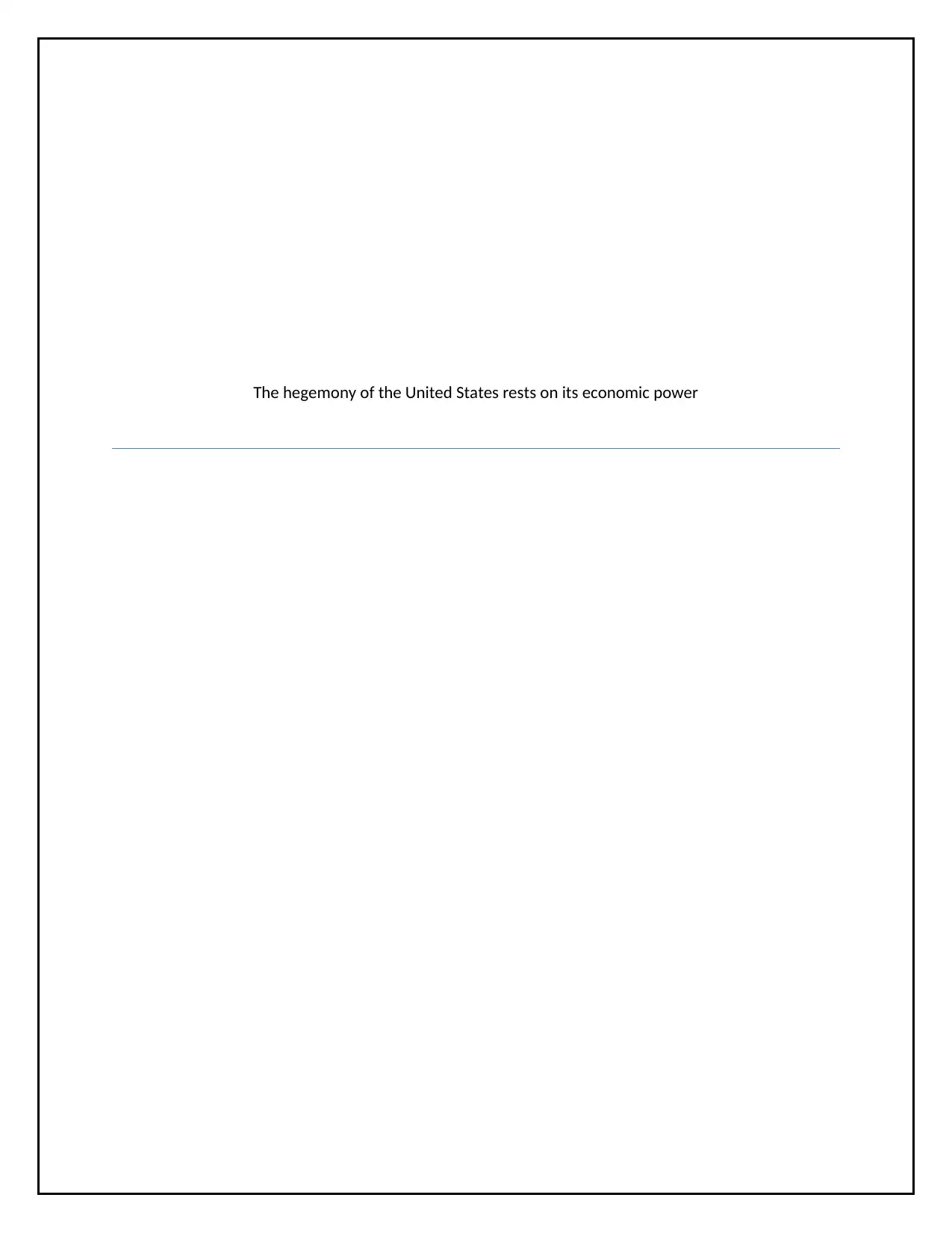
The hegemony of the United States rests on its economic power
Paraphrase This Document
Need a fresh take? Get an instant paraphrase of this document with our AI Paraphraser
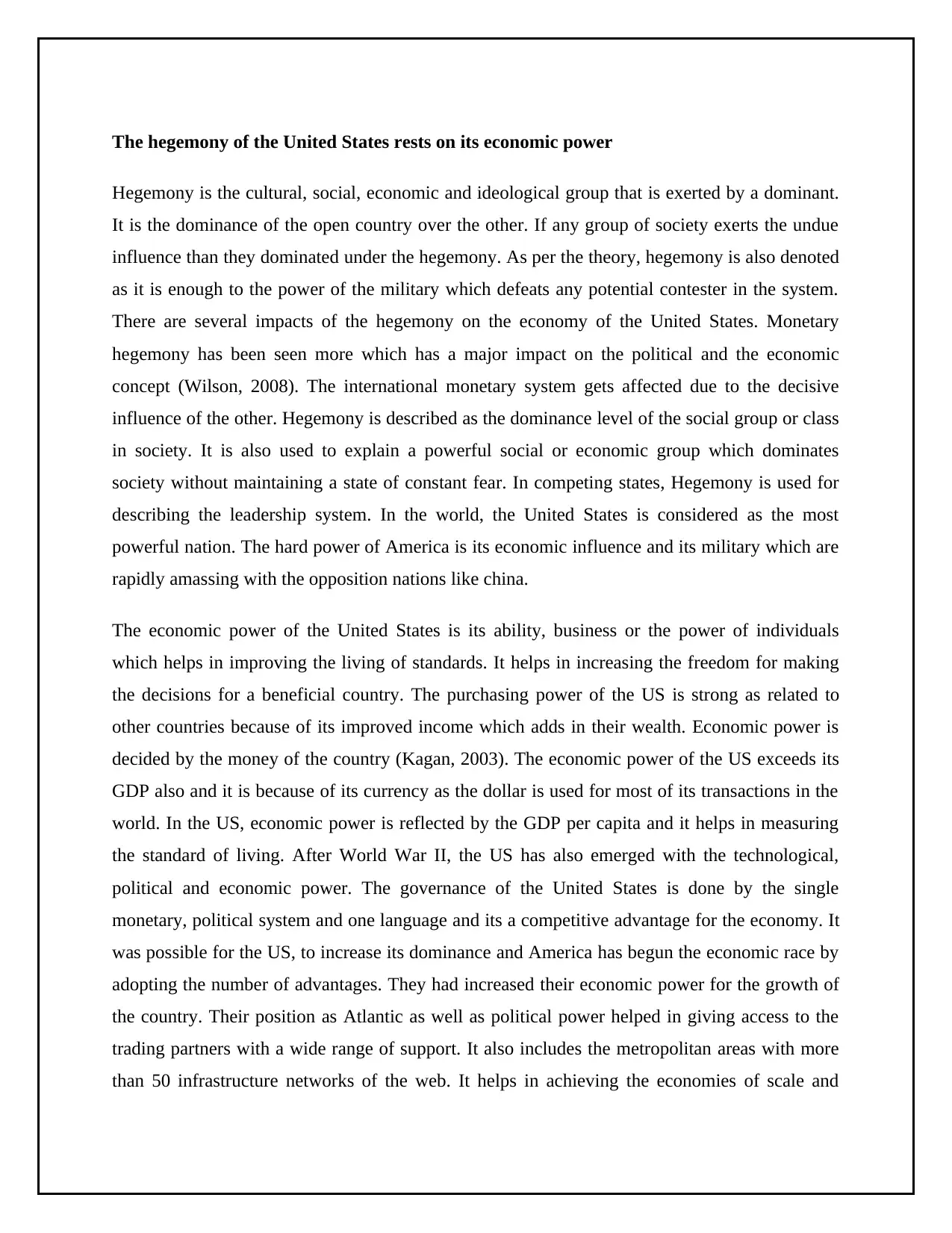
The hegemony of the United States rests on its economic power
Hegemony is the cultural, social, economic and ideological group that is exerted by a dominant.
It is the dominance of the open country over the other. If any group of society exerts the undue
influence than they dominated under the hegemony. As per the theory, hegemony is also denoted
as it is enough to the power of the military which defeats any potential contester in the system.
There are several impacts of the hegemony on the economy of the United States. Monetary
hegemony has been seen more which has a major impact on the political and the economic
concept (Wilson, 2008). The international monetary system gets affected due to the decisive
influence of the other. Hegemony is described as the dominance level of the social group or class
in society. It is also used to explain a powerful social or economic group which dominates
society without maintaining a state of constant fear. In competing states, Hegemony is used for
describing the leadership system. In the world, the United States is considered as the most
powerful nation. The hard power of America is its economic influence and its military which are
rapidly amassing with the opposition nations like china.
The economic power of the United States is its ability, business or the power of individuals
which helps in improving the living of standards. It helps in increasing the freedom for making
the decisions for a beneficial country. The purchasing power of the US is strong as related to
other countries because of its improved income which adds in their wealth. Economic power is
decided by the money of the country (Kagan, 2003). The economic power of the US exceeds its
GDP also and it is because of its currency as the dollar is used for most of its transactions in the
world. In the US, economic power is reflected by the GDP per capita and it helps in measuring
the standard of living. After World War II, the US has also emerged with the technological,
political and economic power. The governance of the United States is done by the single
monetary, political system and one language and its a competitive advantage for the economy. It
was possible for the US, to increase its dominance and America has begun the economic race by
adopting the number of advantages. They had increased their economic power for the growth of
the country. Their position as Atlantic as well as political power helped in giving access to the
trading partners with a wide range of support. It also includes the metropolitan areas with more
than 50 infrastructure networks of the web. It helps in achieving the economies of scale and
Hegemony is the cultural, social, economic and ideological group that is exerted by a dominant.
It is the dominance of the open country over the other. If any group of society exerts the undue
influence than they dominated under the hegemony. As per the theory, hegemony is also denoted
as it is enough to the power of the military which defeats any potential contester in the system.
There are several impacts of the hegemony on the economy of the United States. Monetary
hegemony has been seen more which has a major impact on the political and the economic
concept (Wilson, 2008). The international monetary system gets affected due to the decisive
influence of the other. Hegemony is described as the dominance level of the social group or class
in society. It is also used to explain a powerful social or economic group which dominates
society without maintaining a state of constant fear. In competing states, Hegemony is used for
describing the leadership system. In the world, the United States is considered as the most
powerful nation. The hard power of America is its economic influence and its military which are
rapidly amassing with the opposition nations like china.
The economic power of the United States is its ability, business or the power of individuals
which helps in improving the living of standards. It helps in increasing the freedom for making
the decisions for a beneficial country. The purchasing power of the US is strong as related to
other countries because of its improved income which adds in their wealth. Economic power is
decided by the money of the country (Kagan, 2003). The economic power of the US exceeds its
GDP also and it is because of its currency as the dollar is used for most of its transactions in the
world. In the US, economic power is reflected by the GDP per capita and it helps in measuring
the standard of living. After World War II, the US has also emerged with the technological,
political and economic power. The governance of the United States is done by the single
monetary, political system and one language and its a competitive advantage for the economy. It
was possible for the US, to increase its dominance and America has begun the economic race by
adopting the number of advantages. They had increased their economic power for the growth of
the country. Their position as Atlantic as well as political power helped in giving access to the
trading partners with a wide range of support. It also includes the metropolitan areas with more
than 50 infrastructure networks of the web. It helps in achieving the economies of scale and
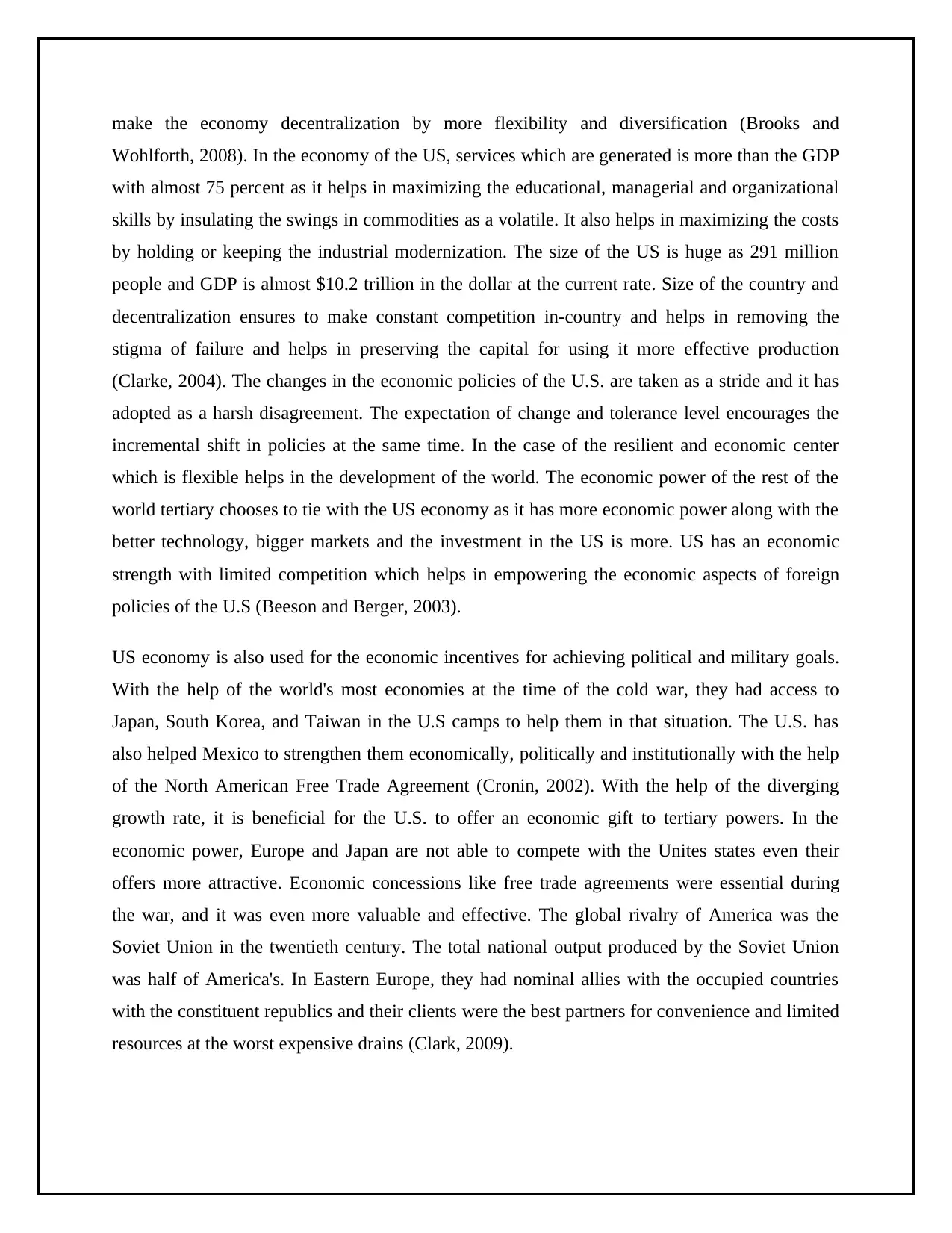
make the economy decentralization by more flexibility and diversification (Brooks and
Wohlforth, 2008). In the economy of the US, services which are generated is more than the GDP
with almost 75 percent as it helps in maximizing the educational, managerial and organizational
skills by insulating the swings in commodities as a volatile. It also helps in maximizing the costs
by holding or keeping the industrial modernization. The size of the US is huge as 291 million
people and GDP is almost $10.2 trillion in the dollar at the current rate. Size of the country and
decentralization ensures to make constant competition in-country and helps in removing the
stigma of failure and helps in preserving the capital for using it more effective production
(Clarke, 2004). The changes in the economic policies of the U.S. are taken as a stride and it has
adopted as a harsh disagreement. The expectation of change and tolerance level encourages the
incremental shift in policies at the same time. In the case of the resilient and economic center
which is flexible helps in the development of the world. The economic power of the rest of the
world tertiary chooses to tie with the US economy as it has more economic power along with the
better technology, bigger markets and the investment in the US is more. US has an economic
strength with limited competition which helps in empowering the economic aspects of foreign
policies of the U.S (Beeson and Berger, 2003).
US economy is also used for the economic incentives for achieving political and military goals.
With the help of the world's most economies at the time of the cold war, they had access to
Japan, South Korea, and Taiwan in the U.S camps to help them in that situation. The U.S. has
also helped Mexico to strengthen them economically, politically and institutionally with the help
of the North American Free Trade Agreement (Cronin, 2002). With the help of the diverging
growth rate, it is beneficial for the U.S. to offer an economic gift to tertiary powers. In the
economic power, Europe and Japan are not able to compete with the Unites states even their
offers more attractive. Economic concessions like free trade agreements were essential during
the war, and it was even more valuable and effective. The global rivalry of America was the
Soviet Union in the twentieth century. The total national output produced by the Soviet Union
was half of America's. In Eastern Europe, they had nominal allies with the occupied countries
with the constituent republics and their clients were the best partners for convenience and limited
resources at the worst expensive drains (Clark, 2009).
Wohlforth, 2008). In the economy of the US, services which are generated is more than the GDP
with almost 75 percent as it helps in maximizing the educational, managerial and organizational
skills by insulating the swings in commodities as a volatile. It also helps in maximizing the costs
by holding or keeping the industrial modernization. The size of the US is huge as 291 million
people and GDP is almost $10.2 trillion in the dollar at the current rate. Size of the country and
decentralization ensures to make constant competition in-country and helps in removing the
stigma of failure and helps in preserving the capital for using it more effective production
(Clarke, 2004). The changes in the economic policies of the U.S. are taken as a stride and it has
adopted as a harsh disagreement. The expectation of change and tolerance level encourages the
incremental shift in policies at the same time. In the case of the resilient and economic center
which is flexible helps in the development of the world. The economic power of the rest of the
world tertiary chooses to tie with the US economy as it has more economic power along with the
better technology, bigger markets and the investment in the US is more. US has an economic
strength with limited competition which helps in empowering the economic aspects of foreign
policies of the U.S (Beeson and Berger, 2003).
US economy is also used for the economic incentives for achieving political and military goals.
With the help of the world's most economies at the time of the cold war, they had access to
Japan, South Korea, and Taiwan in the U.S camps to help them in that situation. The U.S. has
also helped Mexico to strengthen them economically, politically and institutionally with the help
of the North American Free Trade Agreement (Cronin, 2002). With the help of the diverging
growth rate, it is beneficial for the U.S. to offer an economic gift to tertiary powers. In the
economic power, Europe and Japan are not able to compete with the Unites states even their
offers more attractive. Economic concessions like free trade agreements were essential during
the war, and it was even more valuable and effective. The global rivalry of America was the
Soviet Union in the twentieth century. The total national output produced by the Soviet Union
was half of America's. In Eastern Europe, they had nominal allies with the occupied countries
with the constituent republics and their clients were the best partners for convenience and limited
resources at the worst expensive drains (Clark, 2009).
⊘ This is a preview!⊘
Do you want full access?
Subscribe today to unlock all pages.

Trusted by 1+ million students worldwide
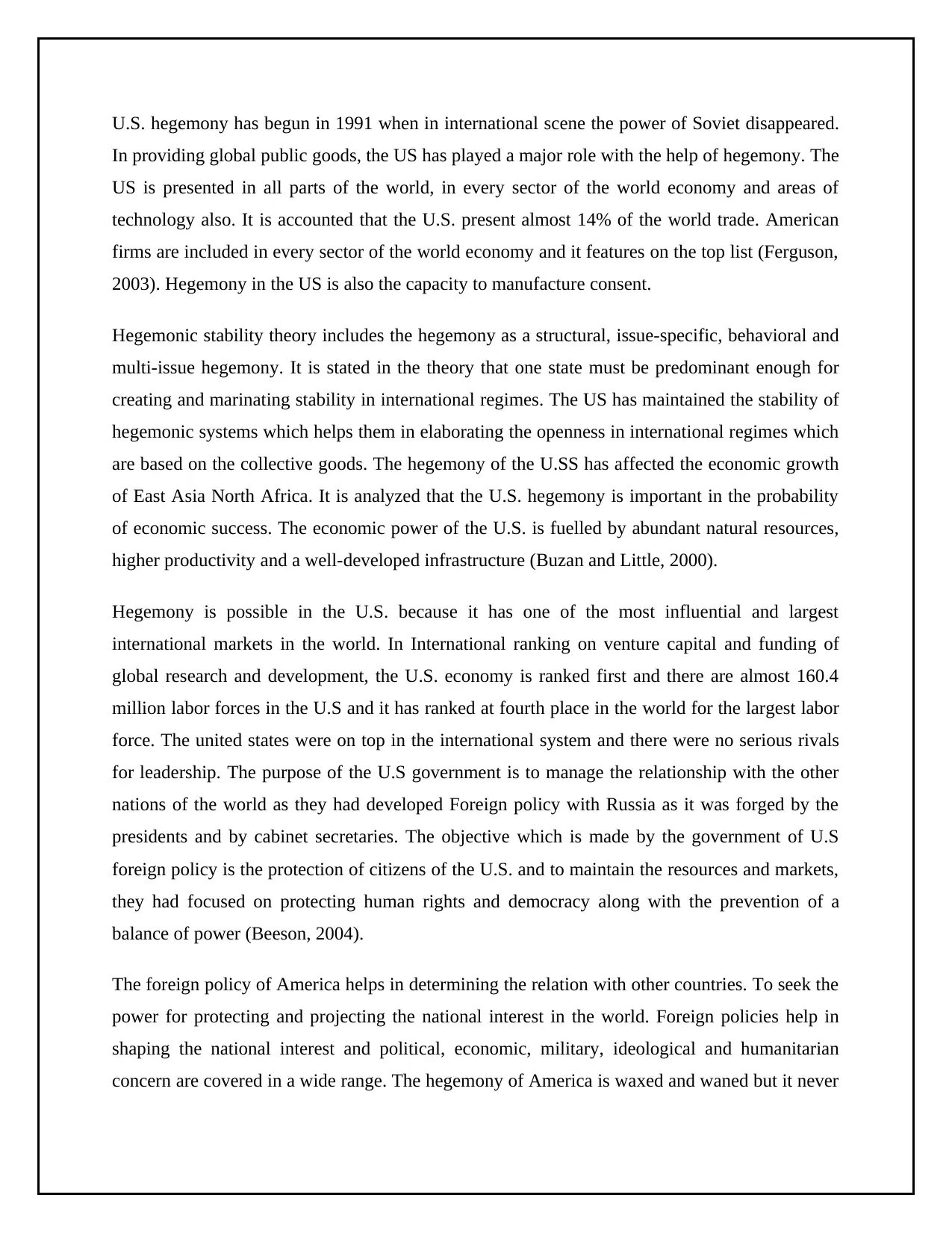
U.S. hegemony has begun in 1991 when in international scene the power of Soviet disappeared.
In providing global public goods, the US has played a major role with the help of hegemony. The
US is presented in all parts of the world, in every sector of the world economy and areas of
technology also. It is accounted that the U.S. present almost 14% of the world trade. American
firms are included in every sector of the world economy and it features on the top list (Ferguson,
2003). Hegemony in the US is also the capacity to manufacture consent.
Hegemonic stability theory includes the hegemony as a structural, issue-specific, behavioral and
multi-issue hegemony. It is stated in the theory that one state must be predominant enough for
creating and marinating stability in international regimes. The US has maintained the stability of
hegemonic systems which helps them in elaborating the openness in international regimes which
are based on the collective goods. The hegemony of the U.SS has affected the economic growth
of East Asia North Africa. It is analyzed that the U.S. hegemony is important in the probability
of economic success. The economic power of the U.S. is fuelled by abundant natural resources,
higher productivity and a well-developed infrastructure (Buzan and Little, 2000).
Hegemony is possible in the U.S. because it has one of the most influential and largest
international markets in the world. In International ranking on venture capital and funding of
global research and development, the U.S. economy is ranked first and there are almost 160.4
million labor forces in the U.S and it has ranked at fourth place in the world for the largest labor
force. The united states were on top in the international system and there were no serious rivals
for leadership. The purpose of the U.S government is to manage the relationship with the other
nations of the world as they had developed Foreign policy with Russia as it was forged by the
presidents and by cabinet secretaries. The objective which is made by the government of U.S
foreign policy is the protection of citizens of the U.S. and to maintain the resources and markets,
they had focused on protecting human rights and democracy along with the prevention of a
balance of power (Beeson, 2004).
The foreign policy of America helps in determining the relation with other countries. To seek the
power for protecting and projecting the national interest in the world. Foreign policies help in
shaping the national interest and political, economic, military, ideological and humanitarian
concern are covered in a wide range. The hegemony of America is waxed and waned but it never
In providing global public goods, the US has played a major role with the help of hegemony. The
US is presented in all parts of the world, in every sector of the world economy and areas of
technology also. It is accounted that the U.S. present almost 14% of the world trade. American
firms are included in every sector of the world economy and it features on the top list (Ferguson,
2003). Hegemony in the US is also the capacity to manufacture consent.
Hegemonic stability theory includes the hegemony as a structural, issue-specific, behavioral and
multi-issue hegemony. It is stated in the theory that one state must be predominant enough for
creating and marinating stability in international regimes. The US has maintained the stability of
hegemonic systems which helps them in elaborating the openness in international regimes which
are based on the collective goods. The hegemony of the U.SS has affected the economic growth
of East Asia North Africa. It is analyzed that the U.S. hegemony is important in the probability
of economic success. The economic power of the U.S. is fuelled by abundant natural resources,
higher productivity and a well-developed infrastructure (Buzan and Little, 2000).
Hegemony is possible in the U.S. because it has one of the most influential and largest
international markets in the world. In International ranking on venture capital and funding of
global research and development, the U.S. economy is ranked first and there are almost 160.4
million labor forces in the U.S and it has ranked at fourth place in the world for the largest labor
force. The united states were on top in the international system and there were no serious rivals
for leadership. The purpose of the U.S government is to manage the relationship with the other
nations of the world as they had developed Foreign policy with Russia as it was forged by the
presidents and by cabinet secretaries. The objective which is made by the government of U.S
foreign policy is the protection of citizens of the U.S. and to maintain the resources and markets,
they had focused on protecting human rights and democracy along with the prevention of a
balance of power (Beeson, 2004).
The foreign policy of America helps in determining the relation with other countries. To seek the
power for protecting and projecting the national interest in the world. Foreign policies help in
shaping the national interest and political, economic, military, ideological and humanitarian
concern are covered in a wide range. The hegemony of America is waxed and waned but it never
Paraphrase This Document
Need a fresh take? Get an instant paraphrase of this document with our AI Paraphraser
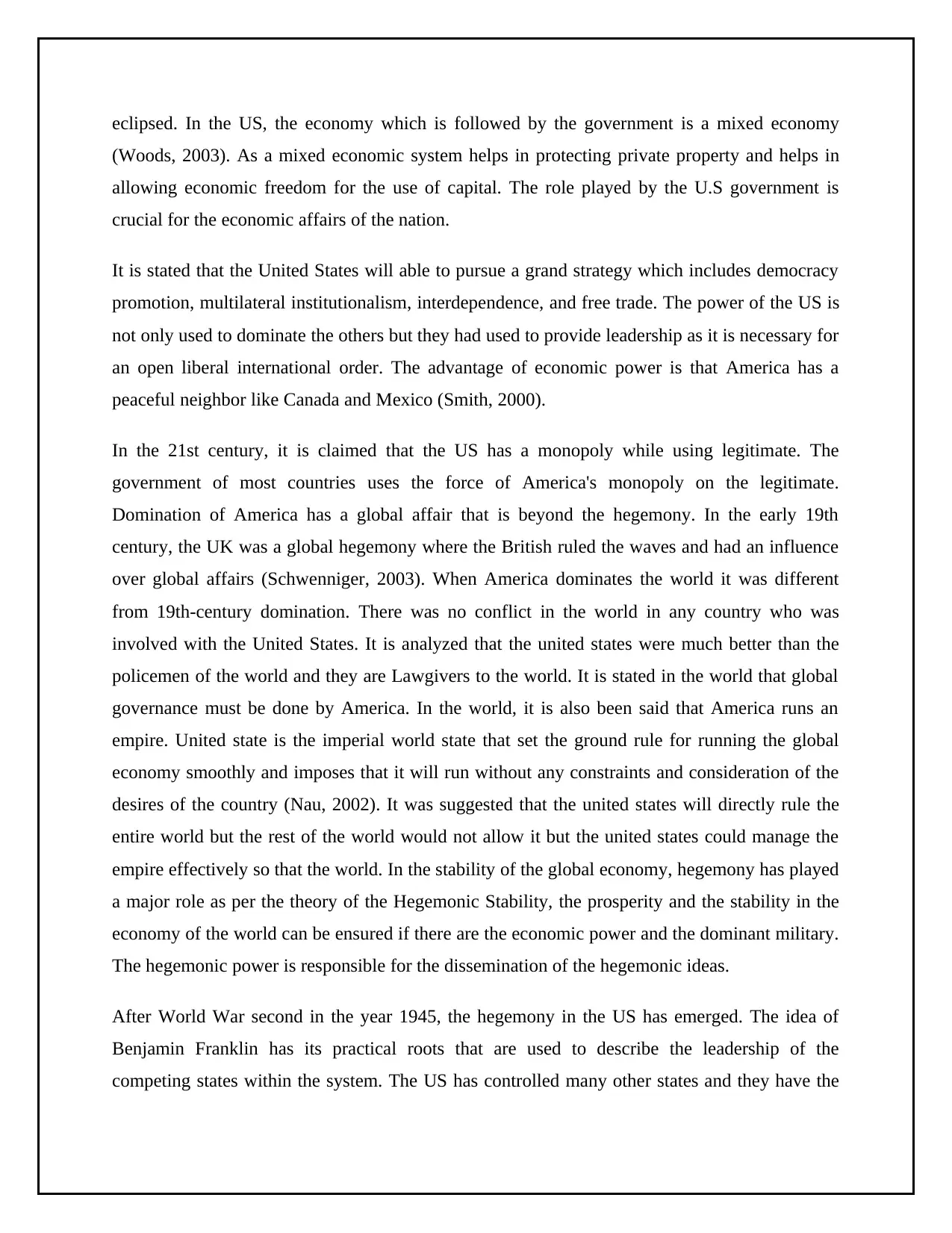
eclipsed. In the US, the economy which is followed by the government is a mixed economy
(Woods, 2003). As a mixed economic system helps in protecting private property and helps in
allowing economic freedom for the use of capital. The role played by the U.S government is
crucial for the economic affairs of the nation.
It is stated that the United States will able to pursue a grand strategy which includes democracy
promotion, multilateral institutionalism, interdependence, and free trade. The power of the US is
not only used to dominate the others but they had used to provide leadership as it is necessary for
an open liberal international order. The advantage of economic power is that America has a
peaceful neighbor like Canada and Mexico (Smith, 2000).
In the 21st century, it is claimed that the US has a monopoly while using legitimate. The
government of most countries uses the force of America's monopoly on the legitimate.
Domination of America has a global affair that is beyond the hegemony. In the early 19th
century, the UK was a global hegemony where the British ruled the waves and had an influence
over global affairs (Schwenniger, 2003). When America dominates the world it was different
from 19th-century domination. There was no conflict in the world in any country who was
involved with the United States. It is analyzed that the united states were much better than the
policemen of the world and they are Lawgivers to the world. It is stated in the world that global
governance must be done by America. In the world, it is also been said that America runs an
empire. United state is the imperial world state that set the ground rule for running the global
economy smoothly and imposes that it will run without any constraints and consideration of the
desires of the country (Nau, 2002). It was suggested that the united states will directly rule the
entire world but the rest of the world would not allow it but the united states could manage the
empire effectively so that the world. In the stability of the global economy, hegemony has played
a major role as per the theory of the Hegemonic Stability, the prosperity and the stability in the
economy of the world can be ensured if there are the economic power and the dominant military.
The hegemonic power is responsible for the dissemination of the hegemonic ideas.
After World War second in the year 1945, the hegemony in the US has emerged. The idea of
Benjamin Franklin has its practical roots that are used to describe the leadership of the
competing states within the system. The US has controlled many other states and they have the
(Woods, 2003). As a mixed economic system helps in protecting private property and helps in
allowing economic freedom for the use of capital. The role played by the U.S government is
crucial for the economic affairs of the nation.
It is stated that the United States will able to pursue a grand strategy which includes democracy
promotion, multilateral institutionalism, interdependence, and free trade. The power of the US is
not only used to dominate the others but they had used to provide leadership as it is necessary for
an open liberal international order. The advantage of economic power is that America has a
peaceful neighbor like Canada and Mexico (Smith, 2000).
In the 21st century, it is claimed that the US has a monopoly while using legitimate. The
government of most countries uses the force of America's monopoly on the legitimate.
Domination of America has a global affair that is beyond the hegemony. In the early 19th
century, the UK was a global hegemony where the British ruled the waves and had an influence
over global affairs (Schwenniger, 2003). When America dominates the world it was different
from 19th-century domination. There was no conflict in the world in any country who was
involved with the United States. It is analyzed that the united states were much better than the
policemen of the world and they are Lawgivers to the world. It is stated in the world that global
governance must be done by America. In the world, it is also been said that America runs an
empire. United state is the imperial world state that set the ground rule for running the global
economy smoothly and imposes that it will run without any constraints and consideration of the
desires of the country (Nau, 2002). It was suggested that the united states will directly rule the
entire world but the rest of the world would not allow it but the united states could manage the
empire effectively so that the world. In the stability of the global economy, hegemony has played
a major role as per the theory of the Hegemonic Stability, the prosperity and the stability in the
economy of the world can be ensured if there are the economic power and the dominant military.
The hegemonic power is responsible for the dissemination of the hegemonic ideas.
After World War second in the year 1945, the hegemony in the US has emerged. The idea of
Benjamin Franklin has its practical roots that are used to describe the leadership of the
competing states within the system. The US has controlled many other states and they have the
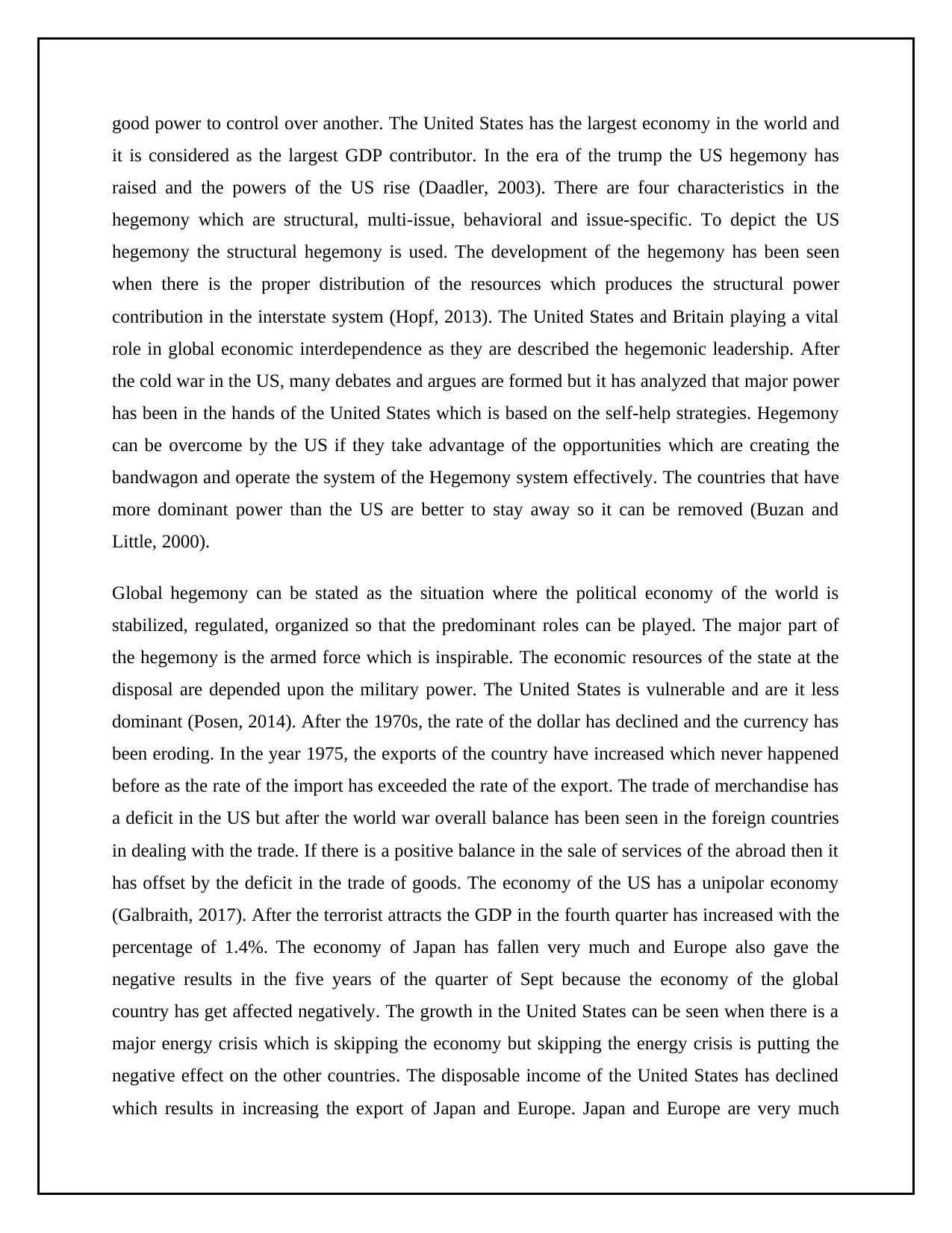
good power to control over another. The United States has the largest economy in the world and
it is considered as the largest GDP contributor. In the era of the trump the US hegemony has
raised and the powers of the US rise (Daadler, 2003). There are four characteristics in the
hegemony which are structural, multi-issue, behavioral and issue-specific. To depict the US
hegemony the structural hegemony is used. The development of the hegemony has been seen
when there is the proper distribution of the resources which produces the structural power
contribution in the interstate system (Hopf, 2013). The United States and Britain playing a vital
role in global economic interdependence as they are described the hegemonic leadership. After
the cold war in the US, many debates and argues are formed but it has analyzed that major power
has been in the hands of the United States which is based on the self-help strategies. Hegemony
can be overcome by the US if they take advantage of the opportunities which are creating the
bandwagon and operate the system of the Hegemony system effectively. The countries that have
more dominant power than the US are better to stay away so it can be removed (Buzan and
Little, 2000).
Global hegemony can be stated as the situation where the political economy of the world is
stabilized, regulated, organized so that the predominant roles can be played. The major part of
the hegemony is the armed force which is inspirable. The economic resources of the state at the
disposal are depended upon the military power. The United States is vulnerable and are it less
dominant (Posen, 2014). After the 1970s, the rate of the dollar has declined and the currency has
been eroding. In the year 1975, the exports of the country have increased which never happened
before as the rate of the import has exceeded the rate of the export. The trade of merchandise has
a deficit in the US but after the world war overall balance has been seen in the foreign countries
in dealing with the trade. If there is a positive balance in the sale of services of the abroad then it
has offset by the deficit in the trade of goods. The economy of the US has a unipolar economy
(Galbraith, 2017). After the terrorist attracts the GDP in the fourth quarter has increased with the
percentage of 1.4%. The economy of Japan has fallen very much and Europe also gave the
negative results in the five years of the quarter of Sept because the economy of the global
country has get affected negatively. The growth in the United States can be seen when there is a
major energy crisis which is skipping the economy but skipping the energy crisis is putting the
negative effect on the other countries. The disposable income of the United States has declined
which results in increasing the export of Japan and Europe. Japan and Europe are very much
it is considered as the largest GDP contributor. In the era of the trump the US hegemony has
raised and the powers of the US rise (Daadler, 2003). There are four characteristics in the
hegemony which are structural, multi-issue, behavioral and issue-specific. To depict the US
hegemony the structural hegemony is used. The development of the hegemony has been seen
when there is the proper distribution of the resources which produces the structural power
contribution in the interstate system (Hopf, 2013). The United States and Britain playing a vital
role in global economic interdependence as they are described the hegemonic leadership. After
the cold war in the US, many debates and argues are formed but it has analyzed that major power
has been in the hands of the United States which is based on the self-help strategies. Hegemony
can be overcome by the US if they take advantage of the opportunities which are creating the
bandwagon and operate the system of the Hegemony system effectively. The countries that have
more dominant power than the US are better to stay away so it can be removed (Buzan and
Little, 2000).
Global hegemony can be stated as the situation where the political economy of the world is
stabilized, regulated, organized so that the predominant roles can be played. The major part of
the hegemony is the armed force which is inspirable. The economic resources of the state at the
disposal are depended upon the military power. The United States is vulnerable and are it less
dominant (Posen, 2014). After the 1970s, the rate of the dollar has declined and the currency has
been eroding. In the year 1975, the exports of the country have increased which never happened
before as the rate of the import has exceeded the rate of the export. The trade of merchandise has
a deficit in the US but after the world war overall balance has been seen in the foreign countries
in dealing with the trade. If there is a positive balance in the sale of services of the abroad then it
has offset by the deficit in the trade of goods. The economy of the US has a unipolar economy
(Galbraith, 2017). After the terrorist attracts the GDP in the fourth quarter has increased with the
percentage of 1.4%. The economy of Japan has fallen very much and Europe also gave the
negative results in the five years of the quarter of Sept because the economy of the global
country has get affected negatively. The growth in the United States can be seen when there is a
major energy crisis which is skipping the economy but skipping the energy crisis is putting the
negative effect on the other countries. The disposable income of the United States has declined
which results in increasing the export of Japan and Europe. Japan and Europe are very much
⊘ This is a preview!⊘
Do you want full access?
Subscribe today to unlock all pages.

Trusted by 1+ million students worldwide
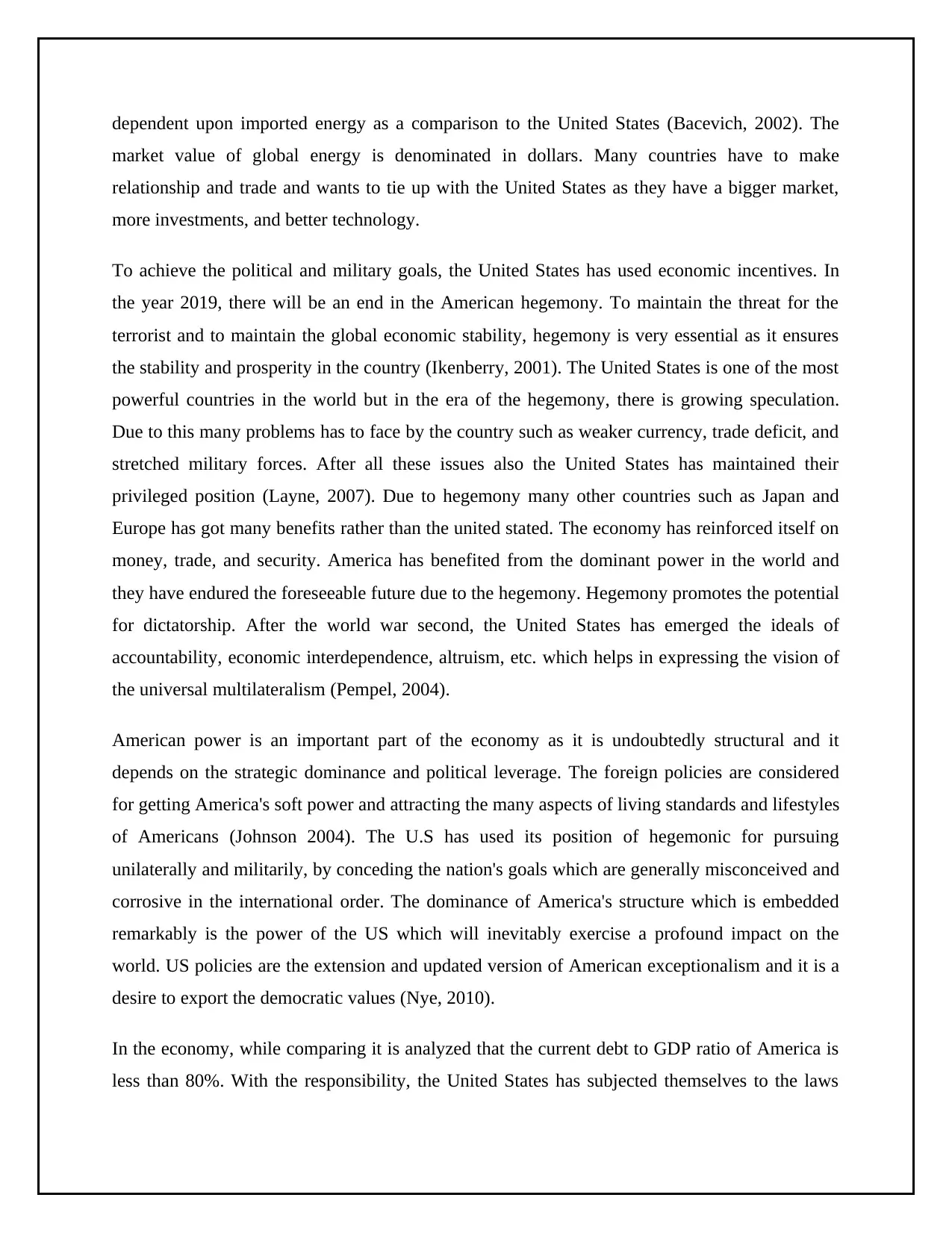
dependent upon imported energy as a comparison to the United States (Bacevich, 2002). The
market value of global energy is denominated in dollars. Many countries have to make
relationship and trade and wants to tie up with the United States as they have a bigger market,
more investments, and better technology.
To achieve the political and military goals, the United States has used economic incentives. In
the year 2019, there will be an end in the American hegemony. To maintain the threat for the
terrorist and to maintain the global economic stability, hegemony is very essential as it ensures
the stability and prosperity in the country (Ikenberry, 2001). The United States is one of the most
powerful countries in the world but in the era of the hegemony, there is growing speculation.
Due to this many problems has to face by the country such as weaker currency, trade deficit, and
stretched military forces. After all these issues also the United States has maintained their
privileged position (Layne, 2007). Due to hegemony many other countries such as Japan and
Europe has got many benefits rather than the united stated. The economy has reinforced itself on
money, trade, and security. America has benefited from the dominant power in the world and
they have endured the foreseeable future due to the hegemony. Hegemony promotes the potential
for dictatorship. After the world war second, the United States has emerged the ideals of
accountability, economic interdependence, altruism, etc. which helps in expressing the vision of
the universal multilateralism (Pempel, 2004).
American power is an important part of the economy as it is undoubtedly structural and it
depends on the strategic dominance and political leverage. The foreign policies are considered
for getting America's soft power and attracting the many aspects of living standards and lifestyles
of Americans (Johnson 2004). The U.S has used its position of hegemonic for pursuing
unilaterally and militarily, by conceding the nation's goals which are generally misconceived and
corrosive in the international order. The dominance of America's structure which is embedded
remarkably is the power of the US which will inevitably exercise a profound impact on the
world. US policies are the extension and updated version of American exceptionalism and it is a
desire to export the democratic values (Nye, 2010).
In the economy, while comparing it is analyzed that the current debt to GDP ratio of America is
less than 80%. With the responsibility, the United States has subjected themselves to the laws
market value of global energy is denominated in dollars. Many countries have to make
relationship and trade and wants to tie up with the United States as they have a bigger market,
more investments, and better technology.
To achieve the political and military goals, the United States has used economic incentives. In
the year 2019, there will be an end in the American hegemony. To maintain the threat for the
terrorist and to maintain the global economic stability, hegemony is very essential as it ensures
the stability and prosperity in the country (Ikenberry, 2001). The United States is one of the most
powerful countries in the world but in the era of the hegemony, there is growing speculation.
Due to this many problems has to face by the country such as weaker currency, trade deficit, and
stretched military forces. After all these issues also the United States has maintained their
privileged position (Layne, 2007). Due to hegemony many other countries such as Japan and
Europe has got many benefits rather than the united stated. The economy has reinforced itself on
money, trade, and security. America has benefited from the dominant power in the world and
they have endured the foreseeable future due to the hegemony. Hegemony promotes the potential
for dictatorship. After the world war second, the United States has emerged the ideals of
accountability, economic interdependence, altruism, etc. which helps in expressing the vision of
the universal multilateralism (Pempel, 2004).
American power is an important part of the economy as it is undoubtedly structural and it
depends on the strategic dominance and political leverage. The foreign policies are considered
for getting America's soft power and attracting the many aspects of living standards and lifestyles
of Americans (Johnson 2004). The U.S has used its position of hegemonic for pursuing
unilaterally and militarily, by conceding the nation's goals which are generally misconceived and
corrosive in the international order. The dominance of America's structure which is embedded
remarkably is the power of the US which will inevitably exercise a profound impact on the
world. US policies are the extension and updated version of American exceptionalism and it is a
desire to export the democratic values (Nye, 2010).
In the economy, while comparing it is analyzed that the current debt to GDP ratio of America is
less than 80%. With the responsibility, the United States has subjected themselves to the laws
Paraphrase This Document
Need a fresh take? Get an instant paraphrase of this document with our AI Paraphraser
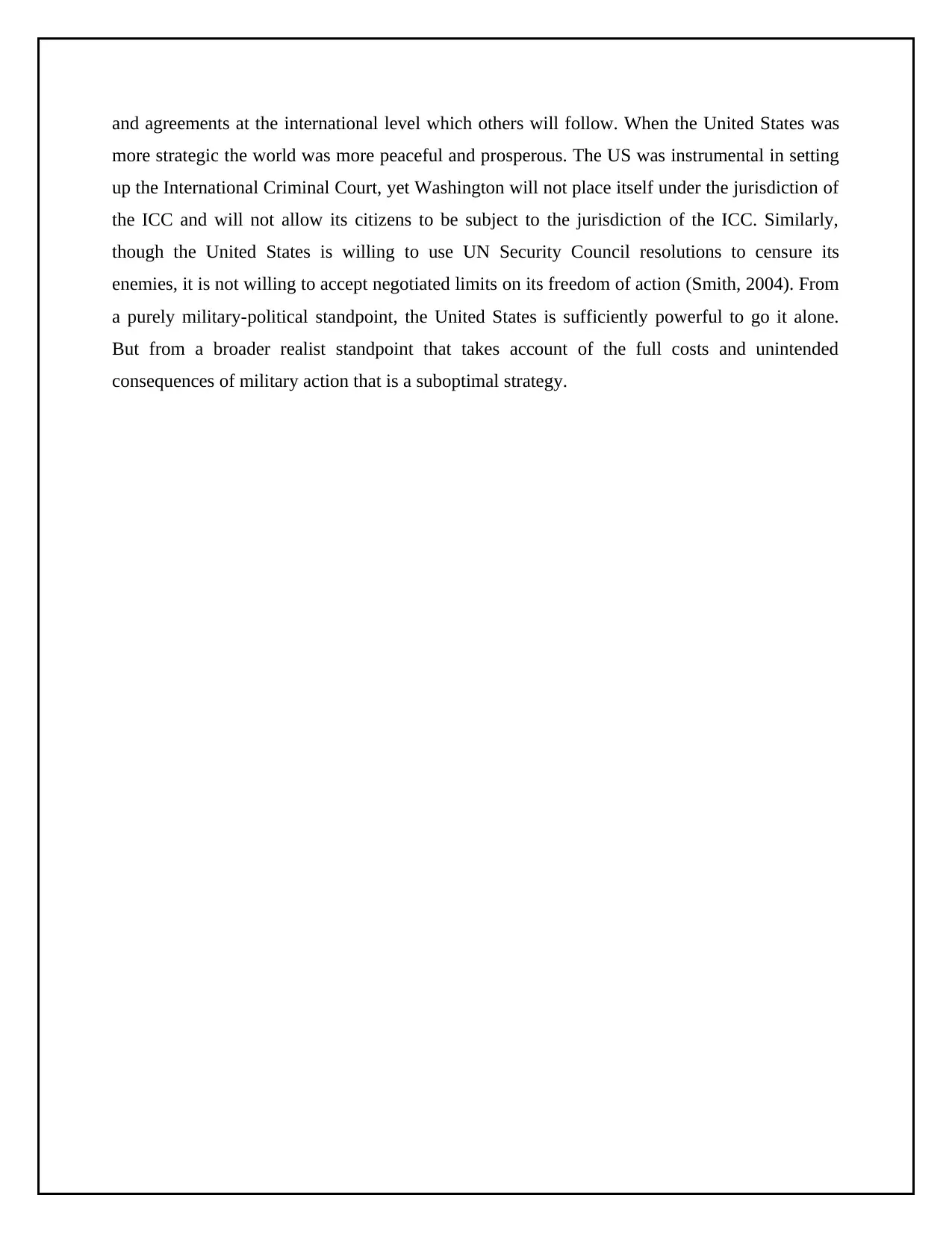
and agreements at the international level which others will follow. When the United States was
more strategic the world was more peaceful and prosperous. The US was instrumental in setting
up the International Criminal Court, yet Washington will not place itself under the jurisdiction of
the ICC and will not allow its citizens to be subject to the jurisdiction of the ICC. Similarly,
though the United States is willing to use UN Security Council resolutions to censure its
enemies, it is not willing to accept negotiated limits on its freedom of action (Smith, 2004). From
a purely military-political standpoint, the United States is sufficiently powerful to go it alone.
But from a broader realist standpoint that takes account of the full costs and unintended
consequences of military action that is a suboptimal strategy.
more strategic the world was more peaceful and prosperous. The US was instrumental in setting
up the International Criminal Court, yet Washington will not place itself under the jurisdiction of
the ICC and will not allow its citizens to be subject to the jurisdiction of the ICC. Similarly,
though the United States is willing to use UN Security Council resolutions to censure its
enemies, it is not willing to accept negotiated limits on its freedom of action (Smith, 2004). From
a purely military-political standpoint, the United States is sufficiently powerful to go it alone.
But from a broader realist standpoint that takes account of the full costs and unintended
consequences of military action that is a suboptimal strategy.
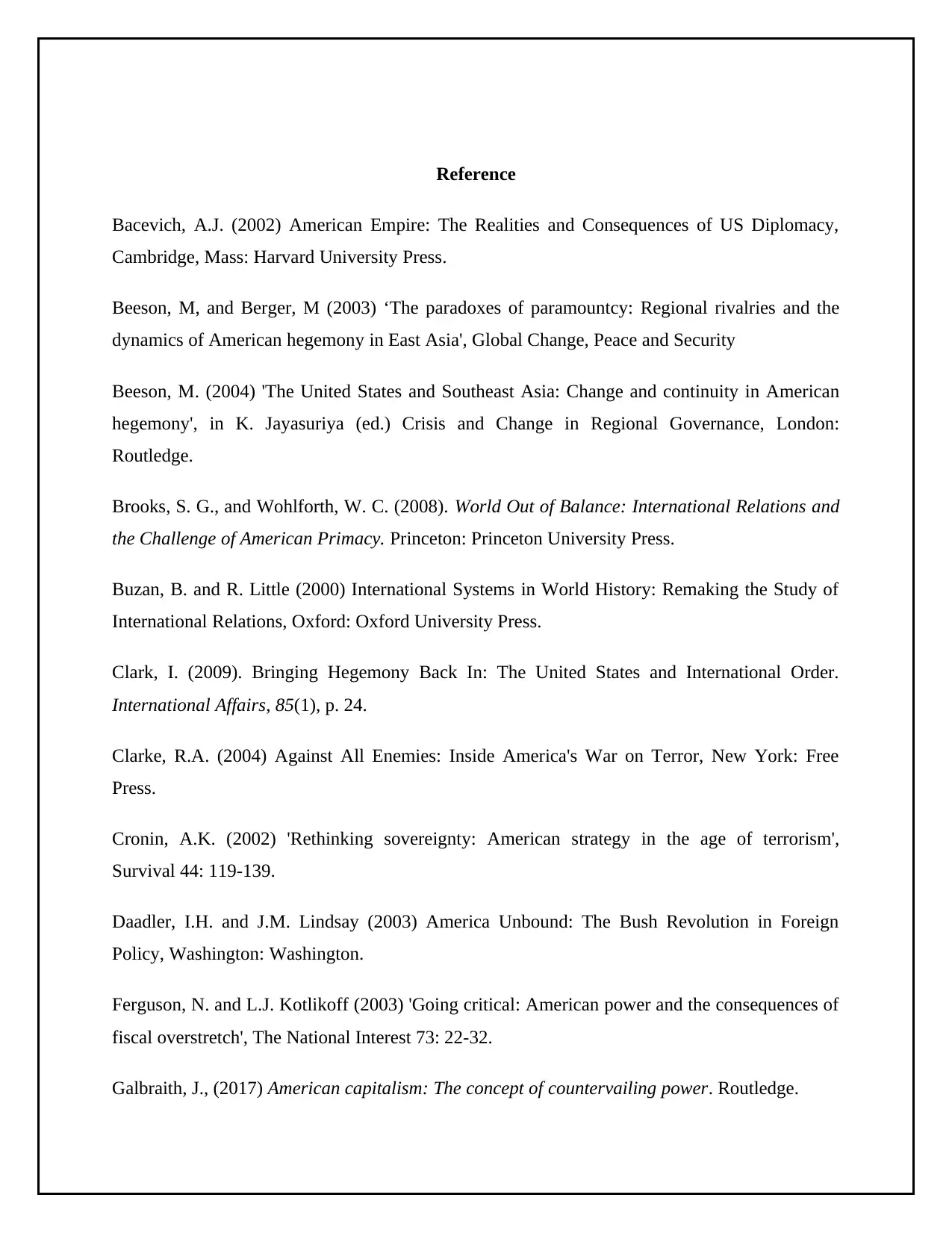
Reference
Bacevich, A.J. (2002) American Empire: The Realities and Consequences of US Diplomacy,
Cambridge, Mass: Harvard University Press.
Beeson, M, and Berger, M (2003) ‘The paradoxes of paramountcy: Regional rivalries and the
dynamics of American hegemony in East Asia', Global Change, Peace and Security
Beeson, M. (2004) 'The United States and Southeast Asia: Change and continuity in American
hegemony', in K. Jayasuriya (ed.) Crisis and Change in Regional Governance, London:
Routledge.
Brooks, S. G., and Wohlforth, W. C. (2008). World Out of Balance: International Relations and
the Challenge of American Primacy. Princeton: Princeton University Press.
Buzan, B. and R. Little (2000) International Systems in World History: Remaking the Study of
International Relations, Oxford: Oxford University Press.
Clark, I. (2009). Bringing Hegemony Back In: The United States and International Order.
International Affairs, 85(1), p. 24.
Clarke, R.A. (2004) Against All Enemies: Inside America's War on Terror, New York: Free
Press.
Cronin, A.K. (2002) 'Rethinking sovereignty: American strategy in the age of terrorism',
Survival 44: 119-139.
Daadler, I.H. and J.M. Lindsay (2003) America Unbound: The Bush Revolution in Foreign
Policy, Washington: Washington.
Ferguson, N. and L.J. Kotlikoff (2003) 'Going critical: American power and the consequences of
fiscal overstretch', The National Interest 73: 22-32.
Galbraith, J., (2017) American capitalism: The concept of countervailing power. Routledge.
Bacevich, A.J. (2002) American Empire: The Realities and Consequences of US Diplomacy,
Cambridge, Mass: Harvard University Press.
Beeson, M, and Berger, M (2003) ‘The paradoxes of paramountcy: Regional rivalries and the
dynamics of American hegemony in East Asia', Global Change, Peace and Security
Beeson, M. (2004) 'The United States and Southeast Asia: Change and continuity in American
hegemony', in K. Jayasuriya (ed.) Crisis and Change in Regional Governance, London:
Routledge.
Brooks, S. G., and Wohlforth, W. C. (2008). World Out of Balance: International Relations and
the Challenge of American Primacy. Princeton: Princeton University Press.
Buzan, B. and R. Little (2000) International Systems in World History: Remaking the Study of
International Relations, Oxford: Oxford University Press.
Clark, I. (2009). Bringing Hegemony Back In: The United States and International Order.
International Affairs, 85(1), p. 24.
Clarke, R.A. (2004) Against All Enemies: Inside America's War on Terror, New York: Free
Press.
Cronin, A.K. (2002) 'Rethinking sovereignty: American strategy in the age of terrorism',
Survival 44: 119-139.
Daadler, I.H. and J.M. Lindsay (2003) America Unbound: The Bush Revolution in Foreign
Policy, Washington: Washington.
Ferguson, N. and L.J. Kotlikoff (2003) 'Going critical: American power and the consequences of
fiscal overstretch', The National Interest 73: 22-32.
Galbraith, J., (2017) American capitalism: The concept of countervailing power. Routledge.
⊘ This is a preview!⊘
Do you want full access?
Subscribe today to unlock all pages.

Trusted by 1+ million students worldwide
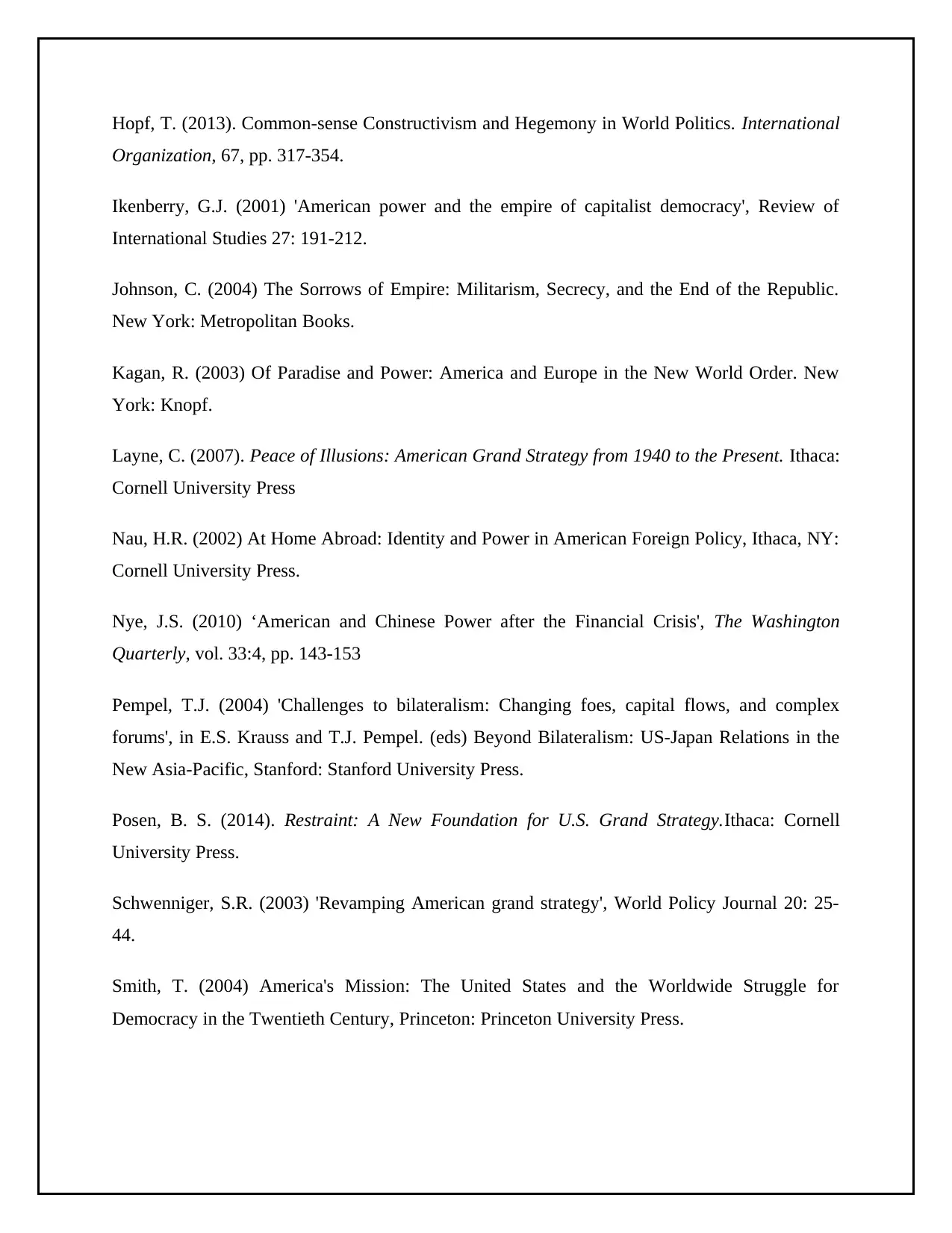
Hopf, T. (2013). Common-sense Constructivism and Hegemony in World Politics. International
Organization, 67, pp. 317-354.
Ikenberry, G.J. (2001) 'American power and the empire of capitalist democracy', Review of
International Studies 27: 191-212.
Johnson, C. (2004) The Sorrows of Empire: Militarism, Secrecy, and the End of the Republic.
New York: Metropolitan Books.
Kagan, R. (2003) Of Paradise and Power: America and Europe in the New World Order. New
York: Knopf.
Layne, C. (2007). Peace of Illusions: American Grand Strategy from 1940 to the Present. Ithaca:
Cornell University Press
Nau, H.R. (2002) At Home Abroad: Identity and Power in American Foreign Policy, Ithaca, NY:
Cornell University Press.
Nye, J.S. (2010) ‘American and Chinese Power after the Financial Crisis', The Washington
Quarterly, vol. 33:4, pp. 143-153
Pempel, T.J. (2004) 'Challenges to bilateralism: Changing foes, capital flows, and complex
forums', in E.S. Krauss and T.J. Pempel. (eds) Beyond Bilateralism: US-Japan Relations in the
New Asia-Pacific, Stanford: Stanford University Press.
Posen, B. S. (2014). Restraint: A New Foundation for U.S. Grand Strategy.Ithaca: Cornell
University Press.
Schwenniger, S.R. (2003) 'Revamping American grand strategy', World Policy Journal 20: 25-
44.
Smith, T. (2004) America's Mission: The United States and the Worldwide Struggle for
Democracy in the Twentieth Century, Princeton: Princeton University Press.
Organization, 67, pp. 317-354.
Ikenberry, G.J. (2001) 'American power and the empire of capitalist democracy', Review of
International Studies 27: 191-212.
Johnson, C. (2004) The Sorrows of Empire: Militarism, Secrecy, and the End of the Republic.
New York: Metropolitan Books.
Kagan, R. (2003) Of Paradise and Power: America and Europe in the New World Order. New
York: Knopf.
Layne, C. (2007). Peace of Illusions: American Grand Strategy from 1940 to the Present. Ithaca:
Cornell University Press
Nau, H.R. (2002) At Home Abroad: Identity and Power in American Foreign Policy, Ithaca, NY:
Cornell University Press.
Nye, J.S. (2010) ‘American and Chinese Power after the Financial Crisis', The Washington
Quarterly, vol. 33:4, pp. 143-153
Pempel, T.J. (2004) 'Challenges to bilateralism: Changing foes, capital flows, and complex
forums', in E.S. Krauss and T.J. Pempel. (eds) Beyond Bilateralism: US-Japan Relations in the
New Asia-Pacific, Stanford: Stanford University Press.
Posen, B. S. (2014). Restraint: A New Foundation for U.S. Grand Strategy.Ithaca: Cornell
University Press.
Schwenniger, S.R. (2003) 'Revamping American grand strategy', World Policy Journal 20: 25-
44.
Smith, T. (2004) America's Mission: The United States and the Worldwide Struggle for
Democracy in the Twentieth Century, Princeton: Princeton University Press.
Paraphrase This Document
Need a fresh take? Get an instant paraphrase of this document with our AI Paraphraser
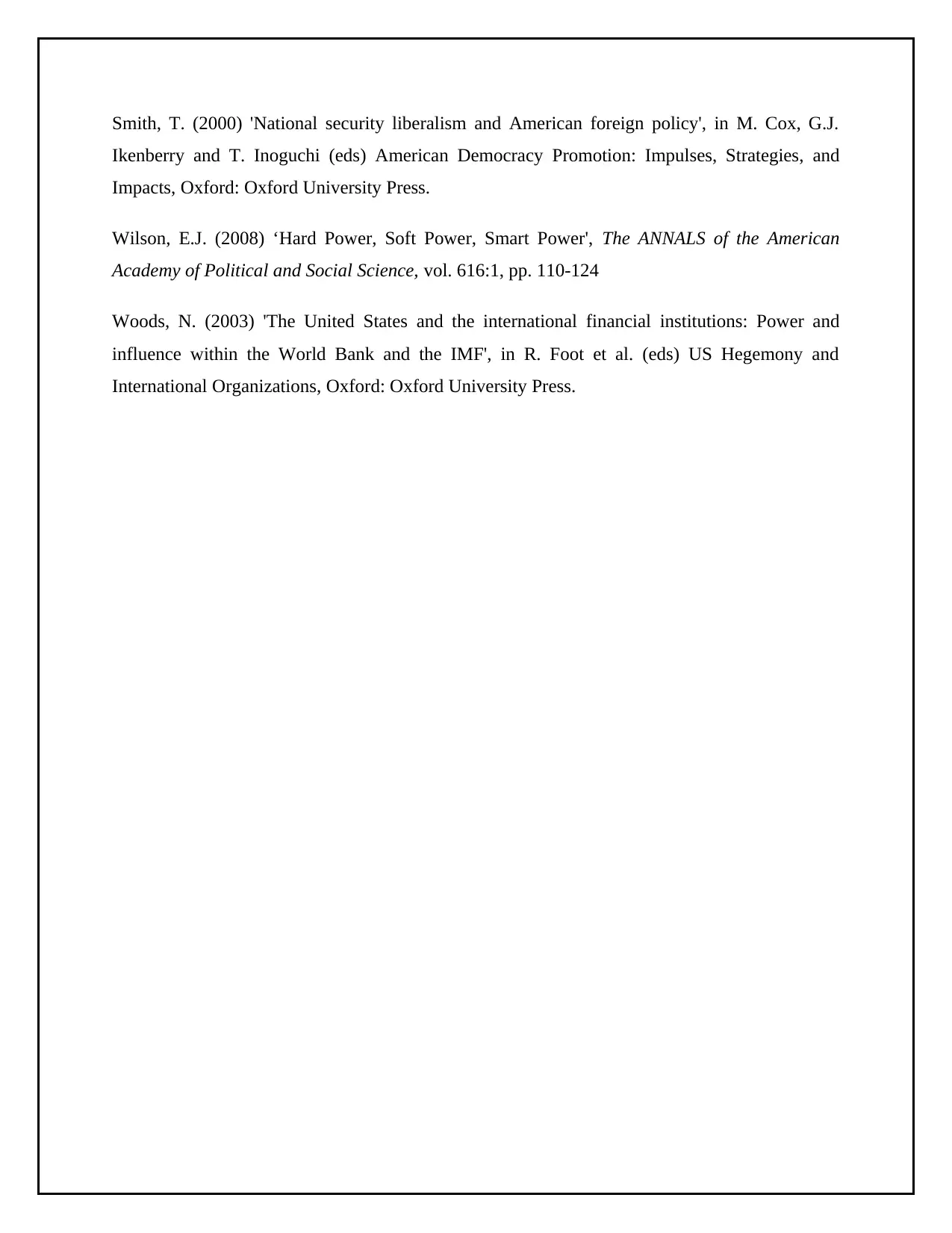
Smith, T. (2000) 'National security liberalism and American foreign policy', in M. Cox, G.J.
Ikenberry and T. Inoguchi (eds) American Democracy Promotion: Impulses, Strategies, and
Impacts, Oxford: Oxford University Press.
Wilson, E.J. (2008) ‘Hard Power, Soft Power, Smart Power', The ANNALS of the American
Academy of Political and Social Science, vol. 616:1, pp. 110-124
Woods, N. (2003) 'The United States and the international financial institutions: Power and
influence within the World Bank and the IMF', in R. Foot et al. (eds) US Hegemony and
International Organizations, Oxford: Oxford University Press.
Ikenberry and T. Inoguchi (eds) American Democracy Promotion: Impulses, Strategies, and
Impacts, Oxford: Oxford University Press.
Wilson, E.J. (2008) ‘Hard Power, Soft Power, Smart Power', The ANNALS of the American
Academy of Political and Social Science, vol. 616:1, pp. 110-124
Woods, N. (2003) 'The United States and the international financial institutions: Power and
influence within the World Bank and the IMF', in R. Foot et al. (eds) US Hegemony and
International Organizations, Oxford: Oxford University Press.
1 out of 11
Related Documents
Your All-in-One AI-Powered Toolkit for Academic Success.
+13062052269
info@desklib.com
Available 24*7 on WhatsApp / Email
![[object Object]](/_next/static/media/star-bottom.7253800d.svg)
Unlock your academic potential
Copyright © 2020–2026 A2Z Services. All Rights Reserved. Developed and managed by ZUCOL.





